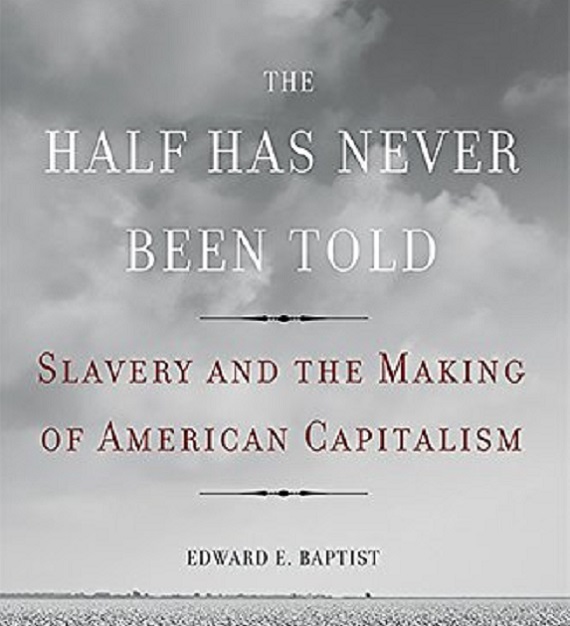A review of The Half Has Never Been Told: Slavery and the Making of American Capitalism (Basic Books, 2014) by Edward Baptist
Recent polling of the millennials’ attitudes toward socialism suggests that higher education on the postmodern campus has better prepared graduates to denounce capitalism than to defend it. Undergraduate enthusiasm for Bernie Sanders’ presidential bid speaks to the point.
In 1946, Encyclopedia Britannica recruited to the task of explaining capitalism’s origin, meaning, and development the eminent Austrian economist Joseph Schumpeter. Schumpeter supplied a characteristically learned and incisive entry that sharply distinguished societies with features of capitalism from those with a full-blown capitalist system. Thus, the appearance of a high level of commercialization in a society or empire, the arbitraging or acquisitive behavior of elites or other social strata in well-articulated markets—ancient Rome, for example—did not necessarily indicate the presence of capitalism. A capitalist society, he said, has at its core the “private ownership of nonpersonal means of production.”
For Schumpeter, at the forefront driving capitalist development stood the heroic entrepreneur who, in an expansive sphere of personal liberty, relentlessly pursued profit for private account and, by imagining new ways to create value, unleashed a dynamic process of “creative destruction.” By qualifying “means of production” with the adjective “nonpersonal,” Schumpeter carefully disassociated from his explication of capitalism’s lineaments the private ownership of personal labor, a condition better known as slavery.
Although no serious modern scholar denies the commercial character of the New World plantations that drove the Atlantic slave trade for more than four centuries, debates continue on the precise role of slavery in propelling the economic growth that liberated Western Europe and the United States from dismal Malthusian cycles. When GDP per person in Western Europe is graphed, this qualitative leap forward into what some would call capitalism shows a line that ascends noticeably in the late 18th century and then, during the first half of the 19th century, for the first time in history, spikes upward like a seismograph registering a magnitude nine earthquake.
Edward E. Baptist, a Cornell University historian, contends that those who have attempted to explain capitalism’s takeoff in the United States have left out a crucial “half of the story.” In choosing to entitle the chapters of The Half Has Never Been Told: Slavery and the Making of American Capitalism with bodily references (“Feet,” “Heads,” “Right Hand” “Left Hand, “Tongues,” “Breath,” “Seed,” “Blood,” “Backs,” “Arms”), he intends to demonstrate how much of the antebellum prosperity of the entire Republic rested on the physical movements of slaves planting and picking cotton.
Not only did a King Cotton capitalist empire of entrepreneurial planters and hard-driven slaves overspread the land from southeast to southwest during the antebellum period, forcing the internal migration of hundreds of thousands of slaves in a kind of second Middle Passage, but profits extracted from slave labor on cotton plantations proved decisive in launching a modern economy in the United States. Thus, for Baptist, “the commodification and suffering and forced labor of African Americans is what made the United States powerful and rich.”
Throughout this deeply flawed and tendentious volume, the author makes dubious, erroneous, and exaggerated assertions on all manner of subjects. Economists will likely pick apart his accounting methods and uncover major errors. Scholars who ask, “Where did he get that?” will find in a disturbing number of cases nonexistent or inadequate noting of sources. Baptist wears his sentiments on his sleeve, and the fruit of his cherry-picking amounts to something less akin scholarship than it is to Theodore Dwight Weld’s penitential abolitionist polemic from 1839, American Slavery As It Is: Testimony of a Thousand Witnesses.
Elite Southern whites, whatever their economic acumen, tend to fare badly in this book, hit with superciliousness and reduced to caricature as thieves, deviants, hypocrites, and scoundrels. No fair reading of the evidence on Thomas Jefferson, for example, can demonstrate beyond reasonable doubt that he fathered so many as one child by Sally Hemings. Indeed, a group of more than a dozen distinguished scholars solicited by the Thomas Jefferson Heritage Society to pore over the evidence leaned overwhelmingly to exculpating Jefferson in a 400-plus page report, which pointed to Thomas’ younger brother Randolph as the likely father of the one child (Eston) for whom the genetic evidence clearly establishes a link to one of any number of Jefferson males. Yet, Baptist represents Thomas as a dirty old man lusting after and repeatedly guilty of ravishing the teenage Hemings.







